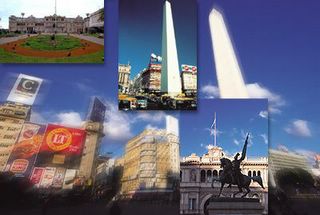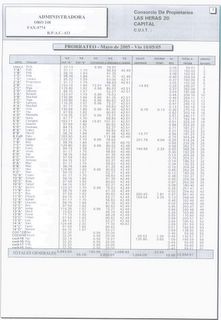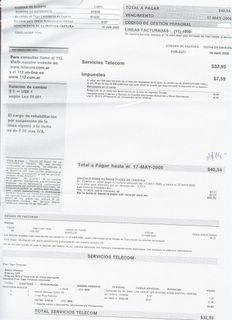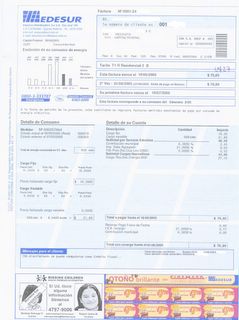"You are a Visionary" - A Summary

BA blur

The comment I have probably heard the most since moving here from the locals is that I'm a "visionary". I'm flattered when I hear that. It is true that I have been perceptive when it comes to the real estate market. My biggest regret is that I did not purchase at the bottom immediately after the crash in December 2001. When everyone was moving all of their money outside of Argentina I was taking a serious look at the potential of real estate in Argentina. Experts say the best time to buy is when there is blood on the street. I tend to agree with that but I feel more comfortable that I formulated a business plan over the course of 2 years instead of jumping in and rushing to purchase real estate. I thought it through.
After the devaluation, I saw that just as the peso was artificially overvalued for 10 years, the US dollar was overvalued when it was approaching 3.8 pesos to u$s 1. I took a significant portion of my savings and starting purchasing Pesos. The locals told me I was crazy. Americans told me I was crazy. Many told me how the rate would hit 5 to 1. I have been publically posting since 2002 that the rate was fairly valued at between 2.75 to 3.25. That has proven to be correct over the past two years. I took all the Pesos I purchased at close to 3.8 and I started purchasing back dollars after I moved here in 2004. I purchased the u$s back at a rate close to 2.95 which I deemed to be fairly valued.
There is a reason I got into the real estate market here in Argentina. Real estate will be around till the end of time. Presidents, governments and politicians, financial crises all come and go but real estate will be around forever. With the unstability of the banking system here in Argentina it makes real estate even more attractive. Real estate will always be a safe haven for citizens of Argentina. Buying an apartment is not like buying 1,000 shares of Amazon.com. No fortunes are going to be lost by purchasing real estate here in Buenos Aires. Now with foreign interest in real estate here -- prices are going up even at a faster rate.
I made a significant amount in the US stock market in the late 1990's but with the meltdown in the stock market I lost more than I ever made. I wish I discovered real estate earlier. In fact, many of my clients are not millionaires with money to burn. The average consulting client is a hard working professional that has worked hard most of their adult lives. Many were fortunate to have purchased real estate in the United States and the UK that they feel was tremendously overvalued. They sold their properties at a tremendous profit and they were looking for a place to diversify their investments. Many of my consulting clients didn't have plans to invest in Argentina before they came here for vacation. Many of them came to Buenos Aires and stayed in one of my owned or managed properties and were impressed with the quality of service and the properties. They could clearly see that I was on to something and this was a good business to be in.
I have never approached any of my consulting clients. These clients could see the price they were paying to stay in a hotel vs. a 5 star apartment. They much preferred a luxury apartment at a fraction of the price of an expensive hotel. People pay $300+/night to stay at nice hotels because they know what to expect. Good service, good location and no uncertainty. Many of my clients used my company every time they came to Buenos Aires and began to see that they knew what to expect in one of our luxurious owned properties. No hassles, no lies, no games and they always got their security deposit back. In fact, something that we are really proud of is that we have never had to keep a security deposit since I founded the company back in 2002.
The capital appreciation potential alone was worth purchasing real estate in Argentina for me. The tremendous rental income is just icing on the cake. Tourism is booming here in Argentina and I see no slowdown for the foreseeable future. We are not resting on our laurels though. We are not just marketing to tourists but businessmen/corporations, Embassies and now I started marketing to cosmetic surgery patients. My vision was to create high occupancy with a number of different groups year-round. That vision has become a reality.
People call me a "visonary". Maybe I am one. I do know that in what I am doing no one loses. I only purchase properties that will be highly desirable properties for rentals. My business plan is very simple. Besides a nominal monthly fee to manage the property, we make a percentage of all rental bookings. Of course we never make any guarantees or promises on the occupancy rates but if we don't rent out your property, we don't make any money. It's that simple.
Unlike a realtor that only wants you to buy an expensive piece of property anywhere in the city, my only goal is that you buy a good property that is rentable. We are in a partnership with each property management client. They make money and we make money so we have an incentive to keep the property filled. I'm in the unique position of being a property owner instead of just a website that books apartments like every other website in Buenos Aires. I know what is important from an owner's perspective.
As I mentioned, there are no losers. My clients are buying wonderful properties that many of them use when they are here. The value of the investment is not going to plummet. In fact, I believe the reverse is true. Argentina wins with tourism dollars flowing into Argentina with both property owners that are purchasing properties and clients that are renting properties. Our company is single handedly responsible for bringing millions upon millions of dollars into Argentina every year with foreign investments and tourism dollars. I would argue that besides the big hotels here in Buenos Aires, my rental clients collectively as a group, are spending more money within Argentina then almost any other group. My clients are dining out everyday, shopping, getting expensive medical procedures, and taking multiple trips within Argentina.
I have outlined the reasons why owning property here in Buenos Aires is a good investment strategy. People not only hire me because they want to make money but also because they want to save money and make sure they don't get cheated and pay fair prices. No one knows the real estate buying process and has a better list of contacts than I do. I hope that many others share in my vision.
What I have created is basically a real estate limited partnership. I am the 'General Manager 'and each of my consulting and property management clients are 'limited Partners'. I have been extremely successful in the past. I am experienced and knowledgeable with the local rental market and trends. I myself am an owner of several properties in Buenos Aires. My objective is to assist you in many possible ways. I am an expert in this matter. At the same time, I welcome comments, suggestions and questions. I not only tell you how much you are making and manage your property but I help keep you updated on market trends, the condition of your property and the capital appreciation of your property. Your objective is to make a profit on your investment. My job is to also help keep my 'limited Partners' stay focused and on track. I do not let you get distracted by things that do not affect the overall bottom line and investment objectives. I can offer many client testimonials to give other new investors an idea of what I have done for them.
For more information on becoming a consultant client and Partner and sharing in our vision, please contact us.
http://www.mikesapartmentsba.com






